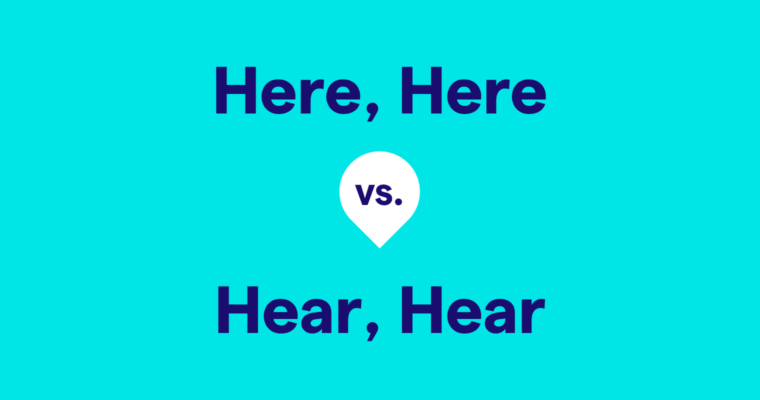
- Hear, hear is the correct phrase used to express agreement or support. It originated in British Parliament and is still used today in both formal and informal settings.
- Here, here is a common misspelling, caused by the fact that hear and here are homophones—words that sound the same but have different meanings and spellings.
- While hear, hear is more commonly used in British English, it is understood globally and often appears in speeches, debates, toasts, and moments of enthusiastic agreement.
In this post, we’ll explore the meaning and origin of hear, hear, explain how to use it correctly, and provide clear examples to illustrate proper usage.
Table of contents
Is it here, here or hear, hear?
Here, here vs. hear, hear FAQs
Is it here, here or hear, hear?
Hear, hear is often confused with here, here, but the correct spelling is hear, hear. The verb hear and the adverb here are homophones—words that sound the same but have different spellings and meanings. Since hear, hear is usually spoken rather than written, the confusion is understandable. Still, here, here remains a common misspelling.
Hear, hear meaning
The phrase hear, hear comes from the 17th-century British Parliament expression hear him, hear him, used to draw attention to a speaker. It was a call of support, urging others to listen. By the 18th century, it had been shortened to the familiar hear, hear, which remains in use today.
The phrase was originally tied to an all-male Parliament, as the first female Member of Parliament (MP) wasn’t elected until the 20th century. Still, hear, hear has endured as a common way to express agreement or encouragement—even today, MPs use it during debates.
The UK Parliament, with roots dating back to the 13th century, continues to uphold many traditional practices. Hear, hear is one such relic that has survived into modern usage.
When you say hear, hear, you’re saying that you agree with something another person has just said. Think of it as an alternative to I agree, well said, or absolutely. It’s also sometimes used as a cheer, which is why you sometimes hear it at the end of toasts or speeches.
While hear, hear is more commonly used in British English, it’s still recognized and understood in American English.
Examples of hear, hear
Here, here vs. hear, hear FAQs
Is here, here or hear, hear the correct spelling?
The correct spelling is hear, hear. The phrase comes from the old parliamentary expression hear him, hear him and is used to show agreement or approval. Here, here is a common misspelling that occurs because the two words sound the same.
What’s the difference between here, here and hear, hear?
Hear, hear is a phrase used to express agreement with what someone has just said. Here, here, on the other hand, is a literal phrase meaning something like “this spot, this spot”—it makes sense spatially, but not in the context of agreement. Because the two phrases are homophones, here, here is often mistakenly used in place of hear, hear.
When is hear, hear used?
Hear, hear is typically used to express strong agreement, especially in formal or public settings, such as parliamentary debates. You might also hear it in speeches, toasts, or even casual conversations where someone wants to enthusiastically support what was just said.






